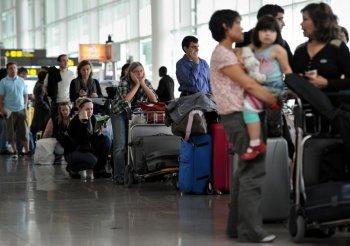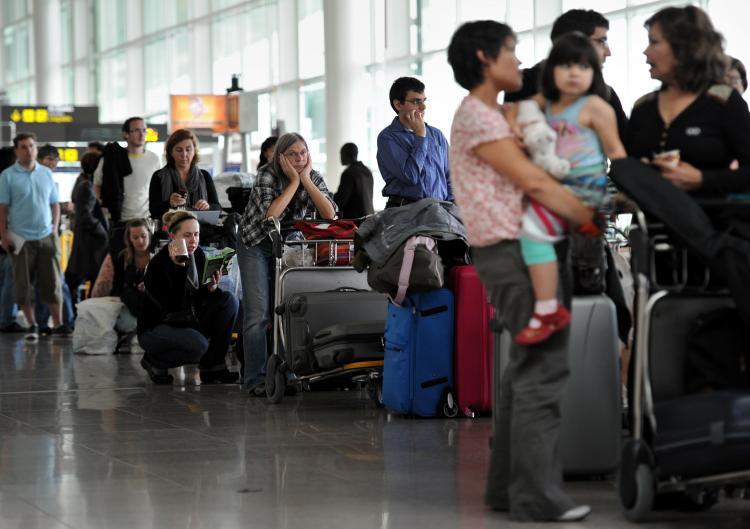MUNICH—Since last Thursday, Europe has been covered by an ash cloud from Iceland’s erupted volcano called Eyjafjallajökull, causing a massive travel freeze and airlines millions of dollars per day.
The ashes from the volcano have formed a thick gray cloud, going as high as 30,000 feet in the air and as wide as the entire North and Western Europe including Germany, U.K., France, Sweden, Netherlands and, of course, Iceland.
The European airlines are flying only to 40 percent of their capacity, avoiding the ash cloud in the direction of South and Eastern Europe. The losses—estimated at around 100 million euros ($134 million)—per day have caused the stock prices of most European airlines to plummet.
Lufthansa’s stock price fell 4 percent on Friday, as the company is losing about 30 million euros per day ($40 million) due to cancelled flights.
“We could easily hit a billion dollars’ loss in revenue next week. The bottom line is that it could not have happened at a more difficult time for airlines that are trying to climb out of the global recession,” said Steve Lott, a spokesman for the International Air Transport Association.
The situation in U.K. is grimmer as all the flights to and out of the country and Ireland have been cancelled, amounting to big losses to British Airways and other British airlines. As a result, some schools and universities are partly closed due to many students and teachers being stranded abroad struggling to return from spring holidays. Additionally, many sports games, concerts, and business meeting have been cancelled.
According to the British newspaper Telegraph, the ash cloud has caused estimated losses of 920 million pounds ($1.4 billion) to the U.K. economy, amounting with a rate of 230 million pounds ($350 million) per day.
Geologists do not know when the volcanic ash could will dissolve and enable the airlines to operate normally in Western Europe. However, they estimated that it is possible that the eruption of Eyjafjallajökull could go on for months, therefore causing more massive traffic disturbances.
“From what we’ve seen, it could erupt, pause for a few weeks, and then possibly erupt again. It could go on for months,” said Sigrun Hreinsdottir, a geophysicist at the University of Iceland told the Telegraph.
“There is no future outlook possible. We cannot say whether any new ash clouds will form over the Baltic Sea,” said German Travel minister, Peter Ramsauer.
“This is Mother Nature. We’re stuck in this phase until the volcano decides to sleep. Even if it cuts off today, which it shows no sign of doing, the ash would take another two to three days to fall out from the skies,” said Paul Knightley, of the forecaster Meteo Group who is investigating the eruption.
“The activity has been quite vigorous overnight, causing the eruption column to grow,” said Icelandic geologist Magnus Tumi Gudmundsson on Saturday. “It’s the magma mixing with the water that creates the explosivity. Unfortunately, there doesn’t seem to be an end in sight.”
While airlines are suffering the consequences of the ash cloud, the rail and bus companies are enjoying the benefits of it. According to German magazine SPIEGEL, the intercity bus lines are running on 500 percent of their normal capacity.
The car rental company Sixt has advertised itself on all the European airports with the following tagline, “Don’t fly in the air with so much ash! Rent our car cheaper at Sixt.
The ashes from the volcano have formed a thick gray cloud, going as high as 30,000 feet in the air and as wide as the entire North and Western Europe including Germany, U.K., France, Sweden, Netherlands and, of course, Iceland.
The European airlines are flying only to 40 percent of their capacity, avoiding the ash cloud in the direction of South and Eastern Europe. The losses—estimated at around 100 million euros ($134 million)—per day have caused the stock prices of most European airlines to plummet.
Lufthansa’s stock price fell 4 percent on Friday, as the company is losing about 30 million euros per day ($40 million) due to cancelled flights.
“We could easily hit a billion dollars’ loss in revenue next week. The bottom line is that it could not have happened at a more difficult time for airlines that are trying to climb out of the global recession,” said Steve Lott, a spokesman for the International Air Transport Association.
The situation in U.K. is grimmer as all the flights to and out of the country and Ireland have been cancelled, amounting to big losses to British Airways and other British airlines. As a result, some schools and universities are partly closed due to many students and teachers being stranded abroad struggling to return from spring holidays. Additionally, many sports games, concerts, and business meeting have been cancelled.
According to the British newspaper Telegraph, the ash cloud has caused estimated losses of 920 million pounds ($1.4 billion) to the U.K. economy, amounting with a rate of 230 million pounds ($350 million) per day.
Geologists do not know when the volcanic ash could will dissolve and enable the airlines to operate normally in Western Europe. However, they estimated that it is possible that the eruption of Eyjafjallajökull could go on for months, therefore causing more massive traffic disturbances.
“From what we’ve seen, it could erupt, pause for a few weeks, and then possibly erupt again. It could go on for months,” said Sigrun Hreinsdottir, a geophysicist at the University of Iceland told the Telegraph.
“There is no future outlook possible. We cannot say whether any new ash clouds will form over the Baltic Sea,” said German Travel minister, Peter Ramsauer.
“This is Mother Nature. We’re stuck in this phase until the volcano decides to sleep. Even if it cuts off today, which it shows no sign of doing, the ash would take another two to three days to fall out from the skies,” said Paul Knightley, of the forecaster Meteo Group who is investigating the eruption.
“The activity has been quite vigorous overnight, causing the eruption column to grow,” said Icelandic geologist Magnus Tumi Gudmundsson on Saturday. “It’s the magma mixing with the water that creates the explosivity. Unfortunately, there doesn’t seem to be an end in sight.”
While airlines are suffering the consequences of the ash cloud, the rail and bus companies are enjoying the benefits of it. According to German magazine SPIEGEL, the intercity bus lines are running on 500 percent of their normal capacity.
The car rental company Sixt has advertised itself on all the European airports with the following tagline, “Don’t fly in the air with so much ash! Rent our car cheaper at Sixt.






